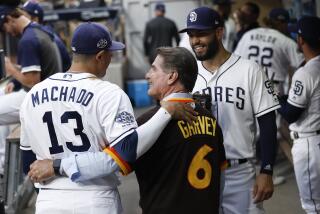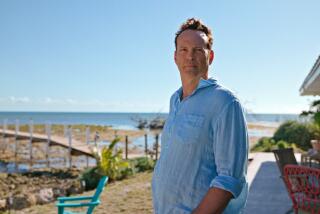Controversy Consumed Lawrence--in Life, Death
- Share via
SAN DIEGO — If he is controversial in death, M. Larry Lawrence was even more so in life.
News accounts about his putative service in the merchant marine and the dispute over whether he deserved to be buried at Arlington National Cemetery have referred to Lawrence as a hotel owner and big-time Democratic contributor.
That’s a bit like saying the late FBI director J. Edgar Hoover was a stout man who headed a federal agency.
In a city that seems to prefer its civic figures to move quietly and cautiously and don a modest demeanor, Lawrence was loud, bold and egotistical.
In a city that is proudly parochial, Lawrence always thought big: He wanted his hotel, across San Diego Bay in Coronado, to be world famous, not just profitable, and he wanted to influence state and national politics, not just local affairs.
And he wanted every bit of credit, and then some, that was due him for his business, political and philanthropic endeavors. He agonized when he felt slighted, as he often did.
“Larry Lawrence was the most self-absorbed, self-important person imaginable,” said San Diego political consultant Larry Remer, a friend of Lawrence’s. “He had an ego as big as his hotel. He saw himself at the center of history, and he was going to be at the center by hook or crook.”
He once looked a fund-raiser in the eye and said, “Fine, how much do I have to give you to get my name on the building?” He was quoted a six-figure amount and immediately wrote a check for what is now the Lawrence Family Jewish Community Center in La Jolla.
He reveled in the fact that his Hotel del Coronado was a favorite stopping spot for American presidents, including President Clinton.
Lawrence was liberal and Jewish in a city where the dominant newspaper ownership was arch-conservative and Catholic. In a military town, he backed the anti-Vietnam War movement and supported the presidential bid of Eugene J. McCarthy.
He felt picked upon by the local press because of his politics and religion. His intensity was absolute, whether he was assailing the Coronado City Council over its refusal to grant a building permit, or feuding with a national or state political figure, or suing the New York stock brokerage Salomon Bros. Inc.
“Larry Lawrence was one of those guys you didn’t want to cross,” said John Kern, a Republican political consultant and former reporter. “You knew he’d come after you one way or another.”
Lawrence was born in 1926 to a neighborhood grocer in the South Side of Chicago. He attended the University of Arizona in the late 1940s, where he played football. He then returned to Chicago, worked in advertising, dabbled in real estate and got involved in Democratic politics.
His march to wealth began when he moved to San Diego in 1953. Later, after he became listed by Forbes as one of the richest Americans, Lawrence liked to say that he arrived “with $300 in my pocket.” But his initial ventures as a home builder in San Diego were assisted by money from his first wife’s family.
He also made money in the insurance business and commodities trading. When he and his partners bought the Hotel del Coronado in 1963, the seaside resort, built in 1888, was run down and considered a candidate for demolition.
Instead Lawrence invested millions and the hotel regained its former glory. His decades of political activism were rewarded in 1993 when Clinton nominated him as ambassador to Switzerland and his fourth wife, Shelia, as a trade envoy. He died in 1996 at age 69.
In four decades of activism, he raised millions of dollars for Democratic candidates and gave millions to charity, arts groups and UC San Diego. His friends say he desperately wanted respect and admiration, but his abrasive manner was often his own undoing.
“He was one of those people who could take a bad situation and make it worse,” said former Democratic Congressman Lionel VanDeerlin, a pallbearer at Lawrence’s funeral.
Like many a public figure, Lawrence burnished his past. Friends and associates say that throughout the years, as he recited his life story, his upbringing in Chicago became more impoverished, his athletic achievements more impressive and his role in advising political leaders more prominent.
“Frank Mankiewicz [George S. McGovern’s campaign manager) once told me that Lawrence believed that . . . McGovern would have been elected if he had just spent more time at the Hotel del,” said George Mitrovich, president and founder of the City Club of San Diego.
He backed Republican Houston Flournoy over Democrat Edmund G. “Jerry” Brown Jr. for governor in 1974--shocking the Democratic faithful--and lamented later that business had prevented him from doing more campaigning.
“With me in the south, and Flournoy in the north, we would have won,” Lawrence said.
There was always an aura of mystery around Lawrence, particularly the purchase by Lawrence and his partners of the hotel in 1963 from a San Diego family whose most prominent member was reputed to be linked to organized crime and was sent to prison on a tax evasion charge.
Lawrence could be charming and erudite, but he could also be salty. He once told a magazine reporter that the trouble with Pete Wilson, who was then San Diego mayor, was that he looked like a guy who had never gotten drunk or spent a night with a woman he’d just met.
He left a trail of business associates and former employees who felt they had been badly treated--but there were others who remembered small kindnesses and his largess.
Even in matters of politics, his language was quite often impolitic. He branded Jerry Brown “an arrogant punk,” even though he had been close to his father, Gov. Edmund G. “Pat” Brown Sr.
The thrice-divorced Lawrence loved to attend opening day at the Del Mar Racetrack, a high point of the social season. His third wife, Jeanne, and his fourth, Shelia, both attractive and fashionable, and much younger than Lawrence, were often the center of attention, much to Lawrence’s delight.
In his latter years, as he fought the ravages of leukemia, Lawrence wanted nothing more than to help elect a Democratic president. He had backed a string of losers: McGovern, Gary Hart, John Glenn and Michael S. Dukakis.
But he and Shelia were early backers of Clinton, raised millions on his behalf and were with the first couple on election night. The Lawrences bought a Georgetown manse and entertained lavishly.
A rumor was spread that the Clintons were considering Coronado as a Western White House. When the Clintons arrived aboard Air Force One for a vacation, Lawrence was there to greet them, his look the very definition of “beaming.”
“Poor Larry,” said one San Diegan, who knew him for decades. “Even with all his money, it was prominence and respectability that he craved. He finally got it, and it turned out bad.”
More to Read
Sign up for Essential California
The most important California stories and recommendations in your inbox every morning.
You may occasionally receive promotional content from the Los Angeles Times.













